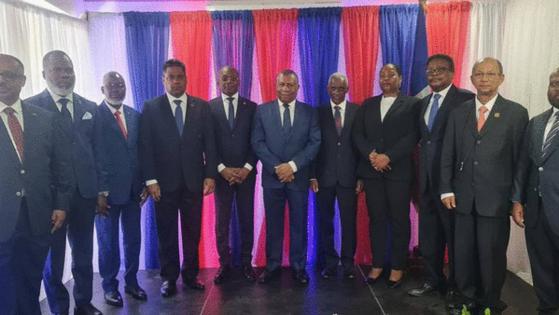Haiti presidential council reverses decision on a prime minister, but crisis continues
Published in News & Features
A majority bloc within Haiti’s new presidential council is doing an about-face on its selection of the country’s next prime minister, saying it will return to the original political agreement to choose the leader of the transitional government from a pool of applicants.
In a press statement issued late Wednesday, the newly emerged political alliance, which is calling itself “The Indissoluble Majority Bloc,” said its four members have resolved to return to the April 3 political agreement that expresses a common vision of the transition to a new government among the nine sectors and political parties that make up the presidential council.
The accord outlines a roadmap for the transition and the governance of the nine-member council tasked with restoring security and staging general elections by Feb. 7, 2026. It also explains how the seven members with voting rights are to go about choosing a president to coordinate their affairs, selecte a new prime minister and form a new cabinet.
In a surprising and controversial move on Tuesday, four of the voting members decided to forgo a public vote on the presidency of the council. They said they had, instead, decided among themselves that former Sen. Edgard Leblanc Fils would serve in the role. They also said they had reached an agreement to designate Fritz Bélizaire, a former minister of youth and sports, as the next prime minister. Hours later, a document was leaked showing the names of the council’s four members who had signed onto the nomination: Smith Augustin, Louis Gérald Gilles, Emmanuel Vertilaire and Leblanc.
Bélizaire’s nomination immediately plunged the council into its first crisis and threatened its implosion. Members of the majority bloc, who represent sectors close to former President Michel Martelly’s Haitian Tèt Kale Parti, or PHTK, were accused of having already distributed key government ministries such as finance, interior and justice, and engaging in the kind of political horse-trading that has created political instability in the past.
“Unfortunately, the charade that took place on April 30, 2024 at the Presidential Council is a conspiracy aimed at guaranteeing power to PHTK and their allies during the transition period and thus perpetuating the tradition of corruption,” the political party Fanmi Lavalas said in a statement.
In a separate statement, the Montana Accord, a coalition of civic society groups whose representative on the council is among those with a vote, said that the four voting members had plotted against the population in the middle of the night.
“The political and economic mafia forces have decided to take control of the presidential council and the government so that they can continue to control the state,” the Montana group said.
The representatives of Fanmi Lavalas, the Montana Accord and the private sector currently make up the minority bloc of the council, which was engaged in its own separate discussions with Leblanc to take charge of the council through a rotating presidency.
Under the political agreement, members of the transitional council are encouraged to find consensus. But should they not be able to, it was also decided that a vote would take place and 4-3 would constitute a majority. The battle for the presidency wasn’t just a fight to name a coordinator but to also gain leverage over who should be the next prime minister, and which groups should control which ministries in the transition.
...continued
©2024 Miami Herald. Visit at miamiherald.com. Distributed by Tribune Content Agency, LLC.







Comments